MPs told to supply own RATs in testing push
Victorian MPs have been told to undergo bi-weekly testing before entering parliament but many are frustrated they’ll have to supply their own RATs.
Coronavirus
Don't miss out on the headlines from Coronavirus. Followed categories will be added to My News.
This coronavirus article is unlocked and free to read in the interest of community health and safety. Tap here to see the latest great value offer for full digital access to trusted news from the Herald Sun and Leader.
Victorian MPs have been asked to undergo twice weekly testing using rapid antigen tests when parliament returns next week.
However, unlike in schools where free RATs have been made available to students and staff, MPs, their staff and visitors to parliament have been asked to draw on their own supplies.
“Similar to school settings, we request everyone coming to the precinct on sitting weeks to undertake a RAT twice a week (Tuesday and Thursday mornings),” a note sent to MPs on Thursday said.
“Members, electorate officers and parliamentary advisers are requested to undertake a RAT twice weekly if coming to the precinct.
“Please source your own RATs if possible. If you are unable to do so, contact the Serjeant-at-Arms or Usher of the Black Rod.”
All other visitors to parliament and parliamentary and contract staff including ministerial staff, government departmental staff and media have also been asked to test twice weekly.
Parliamentary staff said they were frustrated by requests that they source their own tests because of a general lack of supply.
They said it was likely staff would ignore the request unless the RATs were provided.
In August then opposition leader Michael O’Brien called for wider use of RATs.
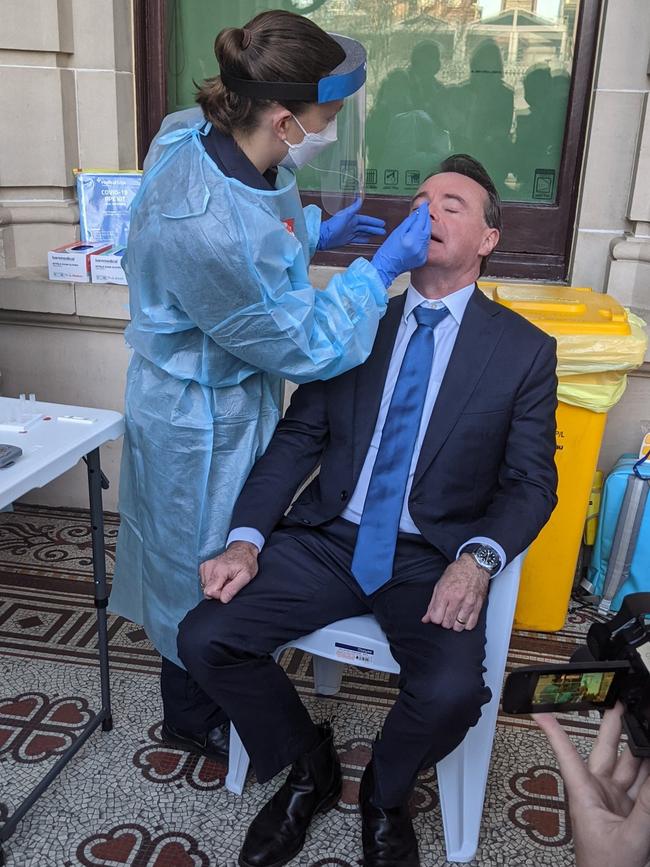
Mr O’Brien, and several opposition MPs, received rapid tests on the steps of parliament in what was dubbed a “political stunt”.
But chief health officer Brett Sutton dismissed the rapid tests at a press conference just hours later, saying they wouldn’t “provide much additional value” to the state at that time.
“When we’re in a situation as we are in Victoria, with no cases or virtually no cases, we want a test that tells us that people are negative when they’re negative, all of the time, as often as possible,” he said.
At the time the rapid tests were being used only in some healthcare settings and had not yet been approved for wider use by the Therapeutic Goods Administration.
The TGA approved the use of the home use tests from November 1.
Deputy Leader of the Liberal Party, David Southwick, accused the government of dragging its feet on the tests.
“Instead of ordering rapid tests when they had the chance, the State Government dragged its heels for months and is now playing catch up,” he said.
“If only this arrogant government had listened back then, communities, schools, hospitals and workplaces would be in such a better place now.”
On Wednesday Daniel Andrews announced rapid antigen tests would soon be manufactured in Victoria.
If approved by the Therapeutic Goods Administration, one million tests a month will be produced from April and three million per month after July.
Full production — which would produce up to 50 million tests each year — is expected to begin from October.
The state government has an order for 166 million RATs, in addition to the 44 million tests procured earlier this month.
SPIKE IN CASES AS SCHOOLS RETURN
Health authorities have recorded an uptick in the proportion of positive rapid antigen tests coming from people aged under 20, as hundreds of Victorian schools battle Covid outbreaks.
The state’s Covid-19 commander, Jeroen Weimar, on Thursday said the spike in cases from a younger cohort was likely caused by the return to the classroom.
“(There is) presumably a significant linkage into our school aged population,” he said.
“We expect to see these numbers bounce around over the next couple of weeks as the schools settle down.”
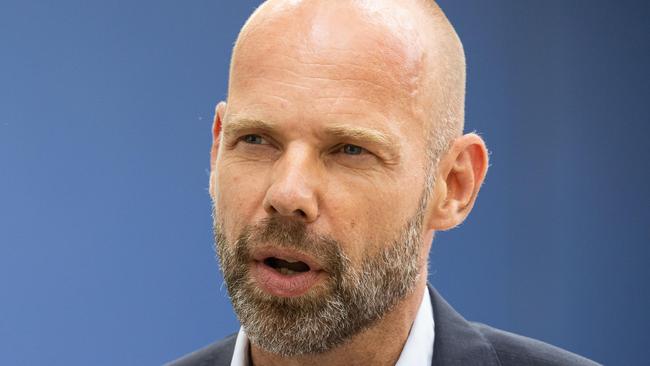
When asked about the larger number of cases in younger children, Premier Daniel Andrews said the state government had expected an increase when schools reopened.
“Once you connect 100,000 households, if not more, that prior to going back are simply not connected ... you were always going to see case numbers go up,” he said.
“That’s why the testing is so, so important.
“Getting back kids to the classroom on day one of term 1 is critically important.
“The moment you’ve made that choice, and I don’t think it is a choice, if you possibly can then you have to do it.
“You then have to acknowledge that means there will be cases. How do we find those cases quickly? How do we cut off those chains of transmission as quickly as possible?
“That’s why we’re doing the two tests a week for four weeks and we’ll review that.”
Mr Andrews said the faster authorities detected infections among students and staff, the smaller outbreaks would be.
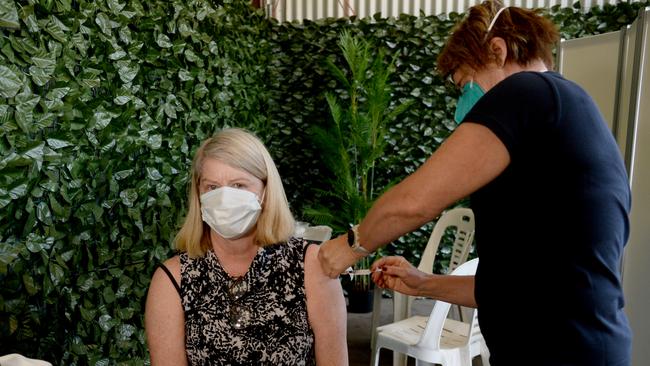
More than 41 per cent of Victoria’s adult population — 2.2 million people — have received their third Covid vaccine, and authorities are urging the community to get jabbed in a bid to speed up the program.
Mr Weimar said there were almost 250,000 available vaccine appointments at state-run clinics over the next 30 days.
“Wherever you want to get it done, please just get it done in the days and weeks ahead,” he said.
Mr Weimar said 114,000 Victorians aged 16 and 17 were now due for their booster shot, with another 30,000 in that age cohort expected to become eligible in the coming weeks.
He added that work was ongoing to ensure that a person’s third dose vaccine certificate could be added to the Service Victoria app. Core data is being held in the Medicare app.
Mr Weimar said the state government continued to await advice from ATAGI about mandating a third dose.
“Certainly our expectation in the Victorian Department of Health would be that we will be moving into a world where to be fully vaccinated will mean to have three doses,” he said.
“If there are future measures that are needed beyond that, we’ll make those announcements at the time.”
WARNING ON NEW COVID WAVE
Health authorities are preparing for a new Omicron wave to sweep the country this winter, with chief medical officer Paul Kelly declaring: “The end is not yet in sight.”
Appearing before the Senate Covid committee on Wednesday, Professor Kelly said he and his overseas counterparts agreed that “we won’t be leaving this pandemic for some time”.
“In the future, we will have more waves. I think we will have another wave of Omicron in winter,” he said.
“But it will be very different because of the booster rollout, because of the availability of treatments and the clinical care that we have.”
“The way we live with Covid is changing, has changed already.”
It comes as Victoria recorded 34 deaths and 12,157 new Covid cases on Thursday, bringing the number of active cases to more than 66,600.
There are 752 people in hospital, including 82 in intensive care, with 29 on ventilators.
During the hearing, it was also revealed that tens of thousands of aged care residents who had received two Covid vaccine doses were yet to get a booster shot.
Professor Kelly warned that hundreds more aged care residents could die from Covid-19 in coming months as he pleaded with elderly Australians to get their booster shot.
As of this week, 99 per cent of nursing homes had been visited to offer boosters, but the committee was told only two thirds of the 89 per cent of residents in those facilities who were fully vaccinated had rolled up their sleeves for the extra jab.
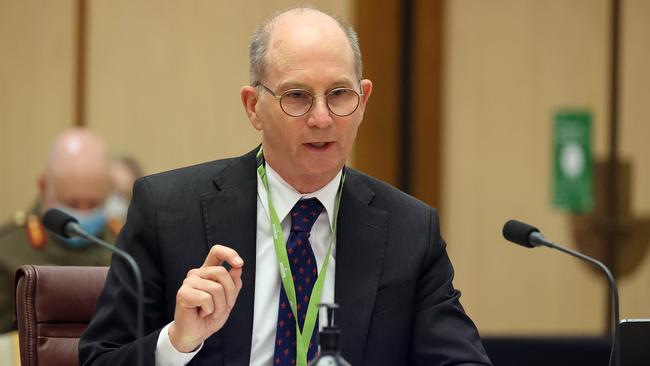
Vaccine rollout chief Lieutenant General John Frewen said nursing homes would soon be visited again so residents would have another chance to get a booster shot.
Aged Care Services Minister Richard Colbeck was unable to say how many of the 471 aged care residents who have died from Covid this year had received a booster, as Professor Kelly expressed his frustration about a lack of data from state authorities on vaccinations.
Senator Colbeck was also grilled over his decision to attend the Ashes Test in Hobart in January instead of appearing before the committee to explain the government’s efforts to protect aged care residents as the Omicron wave took off.
Senator Colbeck, who is also the Sport Minister, said he was “very careful” to balance his portfolio and it would be “hypocritical” of him not to stand by his decision to go to the cricket.
He acknowledged there was “genuine stress” in the system but denied it was in a state of crisis, saying the sector was performing “exceptionally well in the work that it’s doing”.
Appearing before the committee, Therapeutic Goods Administration boss Professor John Skerritt also rejected criticism suggesting the regulator moved too slowly to approve rapid antigen tests.
He said it would have been “dangerous” to give the green light earlier because the available kits were reporting a high proportion of inaccurate results.
The TGA has now approved 23 DIY tests, more than the US regulator. More than 90 applications have been rejected because of a lack of data, and 68 remain under review.
HEALTHCARE WORKER SUPPORT EXTENDED
Surge payments for healthcare workers on the Covid frontline will be extended for another two months.
A Department of Health spokeswoman confirmed the Hospital Surge Support Allowance, introduced in October, would now conclude on March 31 this year.
The allowance is paid to patient-facing healthcare workers who provide direct care in key areas of Victoria’s public hospital services and Ambulance Victoria, including in emergency departments, ICUs and on Covid wards.
“Our dedicated nurses, doctors, allied health professionals and our entire health workforce have risen to the challenge of the Covid pandemic, working day in, day out to keep Victorians safe and healthy,” the spokeswoman said.
“We’ve backed our hard working health workforce with funding for more wellbeing support, investment in more training and the extension of the surge allowance which was provided last year.”
Mr Andrews on Wednesday refused to say when the state’s “code brown” declaration would be lifted.
DEBATE OVER UNION CALL
Melbourne City Council is under fire for advocating unions should be involved in the push to get public servants back to CBD offices.
A motion before a council meeting this week called for Lord Mayor Sally Capp to write to state and federal governments seeking the quick return of their workers to the city amid the “shadow lockdown” continuing to cripple businesses.
But Ms Capp backed an amendment by Labor Party councillor Davyyd Griffiths that the council also tell governments to engage with unions in the process.
The Lord Mayor said she wanted to see the quick and safe return of city workers, but a major consideration was consultation with staff.
“I hope that it would happen in a way to actually accelerate the return of happy workers to city workplaces, and for that reason I will be supporting this amendment,” she told Tuesday night’s meeting.
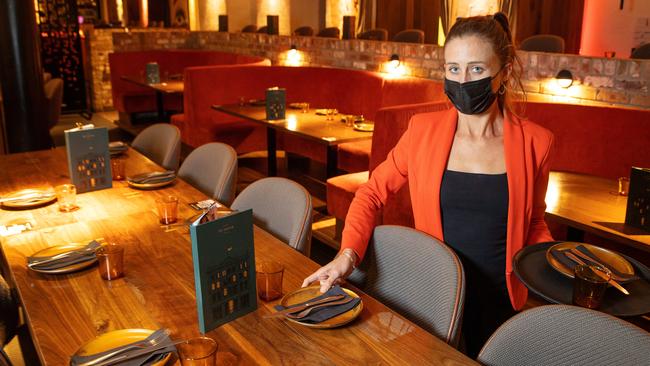
Councillor Roshena Campbell, a Liberal Party member, opposed the amendment, saying it wasn’t the council’s role to advocate for unions. “Given the reluctance of public servants to return, it is inconceivable that the involvement of unions is going to positively facilitate their speedy return while our city is on its knees, when 53 per cent of our surveyed businesses told us they couldn’t last three more months,” she said.
But councillor Elizabeth Doidge, a CFMEU official, said proper representation of public sector workers could expedite return to work.
“No one is feeling safe to come back to the city, and come back to work or return to normal life unless they are well consulted and speak about concerns,” she said.
Greens councillor Rohan Leppert said if the council didn’t back the involvement of unions then it was effectively asking governments “to force public servants back to the office in complete hostility to unions”.
The amended motion was passed 9-1.
Owner of Collins St restaurant The George, Greg Kahan, said the city needed to be talked up to get workers back, and the council should reintroduce discount voucher programs.
The Property Council of Victoria has called for some restrictions to be relaxed with demand for CBD office space surging.




